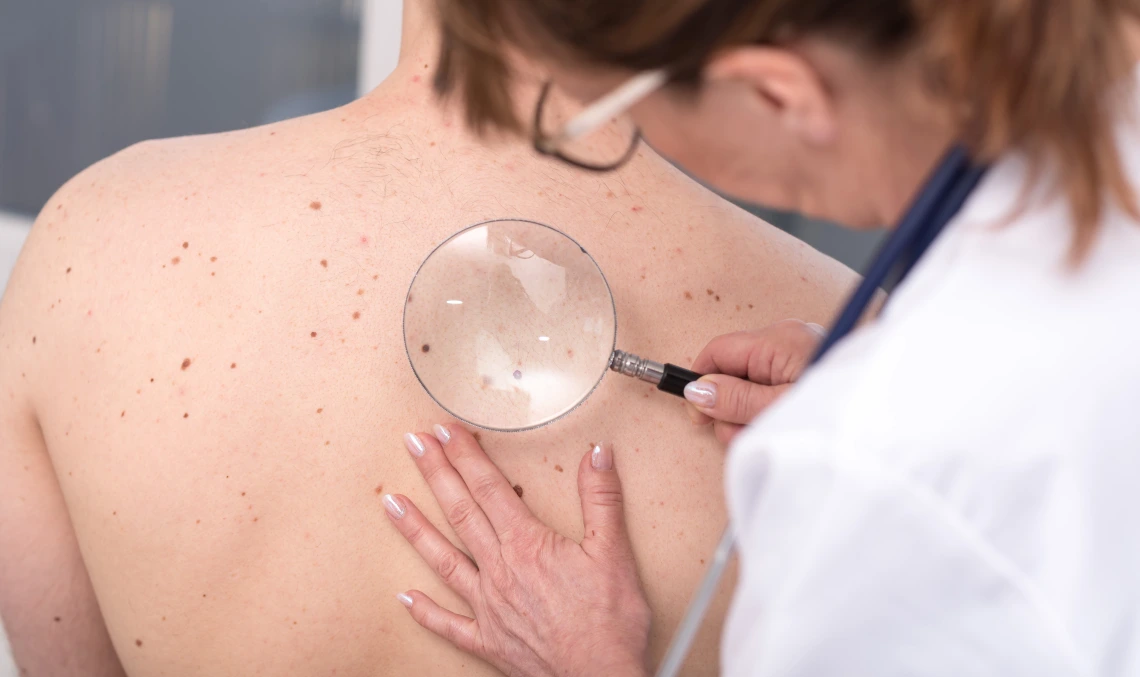U.S. Preventive Services Task Force calls for more research on skin cancer screening
UArizona Cancer Center member co-authors recommendation

University of Arizona Cancer Center member and member of the U.S. Preventive Services Task Force, John Ruiz, PhD, co-authored the Task Force’s final recommendation on screening for skin cancer, which was released today. The Task Force is an independent panel made up of 16 volunteers who are nationally recognized experts in prevention, evidence-based medicine, and primary care and has determined that there is not enough evidence to recommend for or against screening people without symptoms for skin cancer.
"We need more research on whether or not screening for skin cancer in people without symptoms is beneficial,” Ruiz said. “To help prevent skin cancer, people should minimize sun exposure, protect their skin when in the sun, and avoid tanning beds.”
While evidence on screening is limited in all people, the Task Force is also using this recommendation to draw attention to the need for future research to be reflective of the United States, both in terms of including study populations with a diversity of skin tones and settings where access to healthcare varies. “The Task Force needs evidence that accurately reflects the makeup of the nation’s population so that the recommendations have the best chance of improving the health of all,” Ruiz said.
For this recommendation, screening is defined as a visual skin exam by a primary care professional. The recommendation does not apply to people with a family history of skin cancer or those with signs or symptoms, such as irregular moles or any changes in the size, shape, or color of skin growths. Those persons should seek the recommendations of a healthcare professional and be screened as they are advised.
Skin cancer is an abnormal growth of skin cells. It is the most common type of cancer in the United States, but it usually does not cause serious complications or death. There are two main types of skin cancer: melanoma and keratinocyte carcinoma, which consists of basal and squamous cell carcinomas. Melanoma, while not as common, is the deadliest type.
Repeated exposure to sunlight is the main cause of skin cancer. People who have had many sunburns, males, and older people are at increased risk for developing skin cancer. Use of indoor tanning beds is also an important risk factor, particularly for adolescents and young adults. For melanoma specifically, people at increased risk include those with fair skin, light-colored eyes, red or blond hair, a large number of moles, or a family or personal history of skin cancer. However, it is important to note that this recommendation does not apply to people with a personal or family history of skin cancer or with symptoms, such as irregular moles or any changes in the size, shape, or color of skin growths.
People who have noticed changes to their skin or have concerns about skin cancer should talk to their healthcare professional so that they can get the care they need. It is also important that people take actions to protect their skin. The Task Force has a separate, related recommendation on counseling to prevent skin cancer that provides additional guidance to primary care professionals and patients.
The Task Force’s final recommendation statement and corresponding evidence summary have been published online in the Journal of the American Medical Association, as well as on the Task Force website at: https://www.uspreventiveservicestaskforce.org. A draft version of the recommendation statement and evidence review were available for public comment from October 25, 2022, to November 21, 2022.
University of Arizona Cancer Center director, Joann Sweasy, PhD, said that Ruiz’s contributions to the Task Force are indicative of the high-caliber work being done by University of Arizona Cancer Center members in the national spotlight. “I’m proud to know that our researchers are serving at such high levels,” Sweasy said. “John is helping identify areas where we really need to invest more resources, so that we can favorably influence prevention and control. Cancer research needs more funding across the board.”
In addition to being a University of Arizona Cancer Center Member and serving the Center’s Cancer Prevention and Control Program, Ruiz is also a professor of clinical psychology in the Department of Psychology at the University of Arizona, where he is the director of diversity, equity, and inclusivity. Ruiz began a 4-year, federal appointment to serve on the US Preventive Services Task Force in 2022. Ruiz is an elected fellow of the American Psychosomatic Society, Association of Psychological Science, Society for Health Psychology (APA, Division 38), and the Academy of Behavioral Medicine Research.



